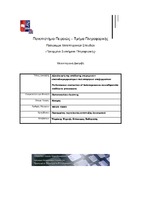Αξιολόγηση της απόδοσης ετερογενών επαναδιαμορφώσιμων πολυπύρηνων επεξεργαστών
Performance evaluation of heterogeneous reconfigurable multicore processors

Προβολή/
Λέξεις κλειδιά
Dynamic Partial Reconfiguration ; Field Programmable Gate Arrays ; Heterogeneous computing ; Heterogeneous Multicore Systems ; Dynamical systemsΠερίληψη
Τα τελευταία χρόνια τα FPGA έχουν διεισδύσει στις αγορές και επιλέγονται όλο και περισσότερο από σχεδιαστές για την υλοποίηση πολυάριθμων εφαρμογών. Τα FPGA εξελίχθηκαν από εξειδικευμένα λογικά κυκλώματα που χρησιμοποιούνταν για την διασύνδεση πολλαπλών εμπορικών κυκλωμάτων, σε συσκευές με υψηλή πυκνότητα επαναπρογραμματιζόμενων λογικών πόρων πού είναι σε θέση να υλοποιήσουν σύνθετα συστήματα σε ένα ολοκληρωμένο κύκλωμα. Ένα από τα μεγαλύτερα πλεονεκτήματα των FPGA είναι η ευελιξία που προσφέρουν καθώς η λειτουργικότητα τους μπορεί να αλλάξει φορτώνοντας ένα νέο configuration file στην μνήμη τους. Επεκτείνοντας την ευελιξία των FPGA με την χρήση δυναμικής μερικής επαναδιαμόρφωσης (Dynamic Partial Reconfiguration) ο εκάστοτε σχεδιαστής έχει την δυνατότητα να επαναδιαμορφώσει περιοχές του FPGA χωρίς να επηρεάζει ολόκληρο το σύστημα. Η δυνατότητα αυτή επιτρέπει στα FPGA να προσαρμόζονται δυναμικά σε συγκεκριμένες προδιαγραφές.
Η παρούσα μεταπτυχιακή διατριβή παρουσιάζει και αξιολογεί μια αποτελεσματική αρχιτεκτονική ετερογενών επαναδιαμορφώσιμων πολυπύρηνων επεξεργαστών. Η αρχιτεκτονική χρησιμοποιεί δυναμική μερική επαναδιαμόρφωση για να προσαρμόσει τους διαθέσιμους πόρους σύμφωνα με τον φόρτο εργασίας. Η αποδοτικότητα επιτυγχάνεται βελτιστοποιώντας την χρήση των πόρων καθώς και την χρήση της ενέργειας παρέχοντας αρκετή υπολογιστική ισχύ έτσι ώστε το σύστημα να τηρεί τις προδιαγραφές. Η αρχιτεκτονική αυτή υλοποιήθηκε και αξιολογήθηκε στην αναπτυξιακή πλατφόρμα Zybo που διαθέτει το Xilinx Zynq-7000 FPGA. Τα αποτελέσματα αυτού του πειράματος καταδεικνύουν ότι με την χρήση της προτεινόμενης αρχιτεκτονικής είναι εφικτό να διατηρηθεί η επιθυμητή απόδοση μειώνοντας την χρήση της ενέργειας.


